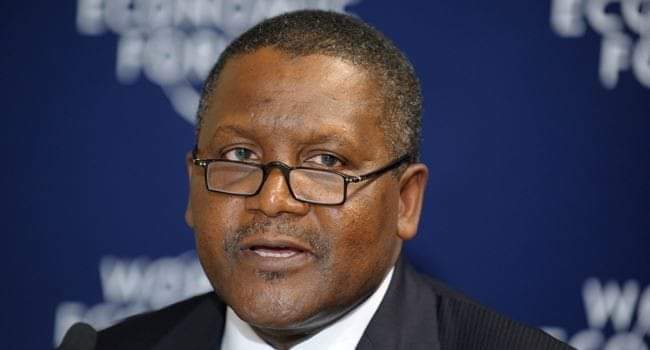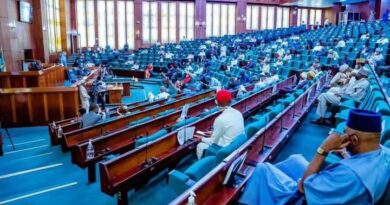Let them NNPC buy me out & run the refinery the best way they can— Dangote offers to sell refinery out of frustration
Africa’s wealthiest man Aliko Dangote said he is willing to give up ownership of his multibillion-dollar oil refinery to the state-owned energy company NNPC Limited.
The billionaire spoke as a new dispute with one of the key equity partners in the plant heats up in the latest phase of a bitter row with regulatory authorities in Nigeria.
The 650,000 barrel-per-day refinery, which came to life last year after a decade of prolonged construction, cost $19 billion, more than double the initial estimate, promising to help wean Africa’s biggest oil producer off its reliance on fuel from overseas and save up 30 per cent of the total foreign exchange spent on importing goods.
“Let them (NNPCL) buy me out and run the refinery the best way they can. They have labelled me a monopolist. That’s an incorrect and unfair allegation, but it’s OK. If they buy me out, at least, their so-called monopolist would be out of the way,” Mr Dangote told PREMIUM TIMES in an exclusive interview on Sunday.
“We have been facing fuel crisis since the 70s. This refinery can help in resolving the problem but it does appear some people are uncomfortable that I am in the picture. So I am ready to let go, let the NNPC buy me out, run the refinery.”
The multisectoral investor’s big bet on oil and gas, which he ventured into following years of relatively stress-free dominance of Nigeria’s cement, salt and sugar industries, is turning out problematic in its early days.
Set for its first roll-out of petrol to the Nigerian market in August, the mammoth plant has been operating just above half its capacity since the January start of refining operations, constrained in part by difficulties in sourcing crude from international producers.
Dangote Refinery said those companies are either demanding outrageous premiums before agreeing to supply crude or simply claiming the product is unavailable.
NNPC, once a sweetheart of the refiner before the current dispute soured relations, had delivered only 6.9 million barrels of oil to the plant as of May since last year, according to S&P Global Platts, a tracker of supply data.
NNPC Limited has a supply deal with the company dating back to the commencement of operations and previously agreed to a 20 per cent equity participation, the refinery saying only 7.2 per cent has been fully paid for before the deadline issued to the company to acquire the stake.
Starving the refinery of the feedstock required to keep it running at present capacity means it has turned to countries like Brazil and the US to bridge the gulf in supply.
“As you probably know, I am 67 years old, in less than three years, I will be 70. I need very little to live the rest of my life. I can’t take the refinery or any other property or asset to my grave. Everything I do is in the interest of my country,” Mr Dangote told PREMIUM TIMES.
“This refinery can help in resolving the problem but it does appear some people are uncomfortable that I am in the picture. So I am ready to let go, let the NNPC buy me out, run the refinery. At least the country will have high-quality products and create jobs,” he added.
Mr Dangote said the obstacles his refinery is facing seem to have vindicated friends and associates who conselled him to tread with caution as he pumped billions of dollars into the Nigerian economy.
“Four years ago, one of my very wealthy friends began to invest his money abroad. I disagreed with him and urged him to rethink his action in the interest of his country. He blamed his action on policy inconsistencies and shenanigans of interest groups. That friend has been taunting me in the past few days, saying he warned me and that he has been proven right,” the businessman said.
Last month, Devakumar Edwin, who serves as the vice president, oil and gas, at the Dangote Group accused the Nigerian Midstream and Downstream Petroleum Regulatory Authority (NMDPRA) of allowing marketers to import dirty fuel into the country.
That has drawn a reprisal from the main watchdog of Nigeria’s midstream and downstream operations whose chief, Farouk Ahmed, claimed diesel from the plant as well as the one from modular refineries like Waltersmith and Aradel contain high sulphur levels.
A high sulphur content in fuel could be injurious to vehicle engines and is known to be harmful to the environment in that it further heats up the fast-warming climate.
“The AGO quality in terms of sulphur is the lowest as far as West Africa’s requirement of 50 parts per million (ppm). Dangote refinery, as well as some major refineries like Waltersmith refinery, produce between 650 ppm to 1,200 ppm. So, in terms of quality, their quality is much more inferior to the imported quality,” Mr Ahmed told journalists last Thursday.
On Saturday, Mr Dangote debunked the claim during a tour of both Dangote Petroleum Refinery and the Dangote Fertiliser Limited complex by members of the House of Representatives, the Speaker of the House of Representatives, Tajudeen Abbas and other members.
The company in a statement said the representatives observed the testing of Automotive Gas Oil (diesel) from two petrol stations alongside Dangote Petroleum Refinery, praised the company for its significant investments and contributions to Nigeria’s development.
“The Chairman of the House Committee on Downstream, Ikenga Ugochinyere, and Chairman of the House Committee on Midstream, Okojie Odianosen, oversaw the collection of samples from the Mild Hydro Cracking (MHC) unit of Dangote refinery for testing of all the samples,” the statement said.
“Lab tests revealed that Dangote’s diesel had a sulphur content of 87.6 ppm (parts per million), whereas the other two samples showed sulphur levels exceeding 1800 ppm and 2000 ppm respectively.
“Dangote emphasised that these findings debunked claims made by Farouk Ahmed, CEO of the Nigerian Midstream and Downstream Petroleum Authority, who recently asserted that imported diesel surpasses domestically refined products. Ahmed had alleged that Dangote refinery and other modular refineries like Waltersmith and Aradel produced diesel with sulphur content ranging from 650 to 1200 ppm—a statement criticised by many Nigerians as a tactic to favour imported products over local ones.”
Mr Dangote openly challenged the regulator to compare the quality of refined products from his refinery with those imported, advocating for an impartial assessment to determine what best serves the interests of Nigeria.
On Saturday, the businessman announced plans to halt his investment in Nigeria’s steel industry to avoid being accused of monopoly.
“You know, about doing a new business which we announced, that is, steel. Actually, our board has decided that we shouldn’t do the steel because if we do the steel business, we will be called all sorts of names like monopoly. And then also, imports will be encouraged,” Mr Dangote said.




